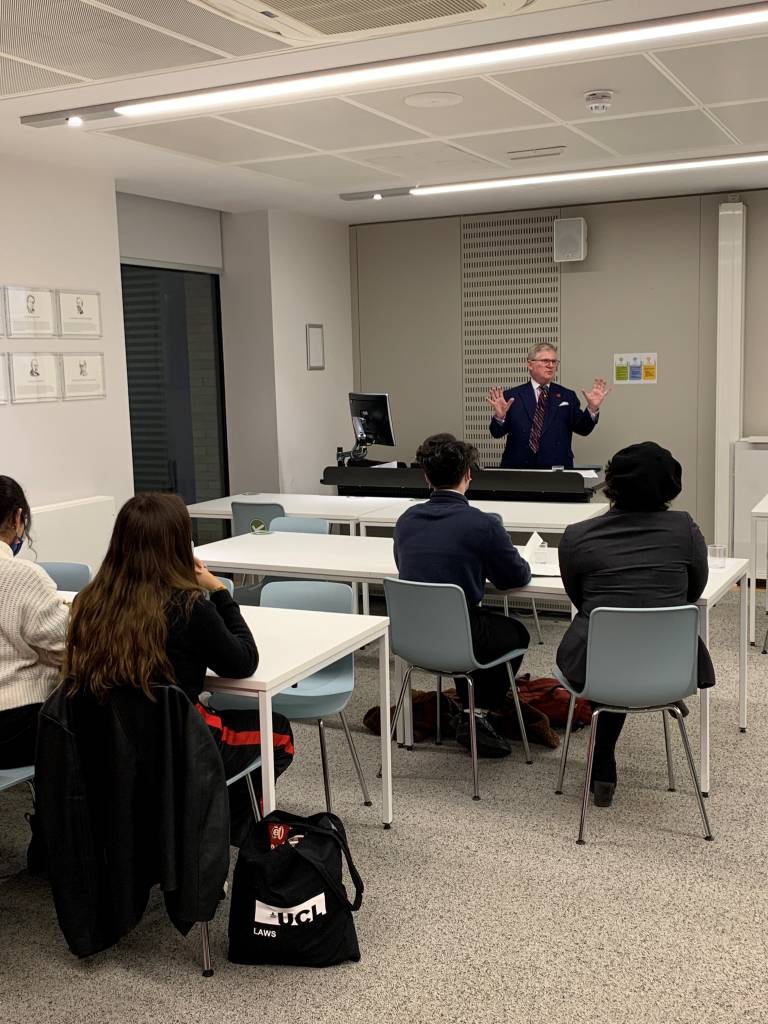Advocacy Masterclass Event with Tribunal Judge Easterman
25 November 2021
On 3 November 2021, the UCL Centre for Access to Justice and Student Pro Bono Committee hosted Tribunal Judge Nicholas Easterman at Bentham House, where he conducted a bespoke Advocacy Masterclass session to UCL Laws students in attendance.

Tribunal Judge Nicholas Easterman is a Diversity and Community Relations Judge (DCRJ) located in the First-Tier Tribunal Immigration and Asylum Chamber (Hatton Cross). He kindly delivered a bespoke Advocacy Masterclass to a group of UCL Laws students, teaching them about the practicalities of advocacy in court.
Key Tips from Judge Easterman’s Masterclass
Here is a summary of the tips provided by Judge Easterman:
Signposting: It is useful to give your listener an idea of what you are going to say, so that if they lose attention, they can pick it up again quite quickly. “Tell them what you’re going to tell them, tell them, and then tell them what you’ve told them.”
Written advocacy: Written advocacy is just as important as oral advocacy. Judge Easterman also related a story about a bright pupil who introduced the skeleton argument to him, at a time when prosecutors did not have anything prepared. The effectiveness of this was proved when large chunks of that skeleton argument was eventually read out in the judgment, showing how much it contributed to convincing the judge.
Tailoring your approach: One should have a different approach for different contexts. If something is expected, conform to those expectations. For example, what you say in front of a Magistrate would differ from what you would say in front of a District Judge; and what is said in front of a jury is certainly not what you would say in front of a Crown Court Judge. They require different approaches to persuading. At first instance they may be less interested in the nice legal points, while at appeal that’s all that they will be interested in. “Horses for courses.”
Knowing where you are and why you are there: Knowing where you are helps you pitch the right argument and knowing why you are there prevents you from arguing a moot point. For example, in a criminal case, if your client has plead guilty to theft, you should not appear before the court and argue that they were not dishonest, because they cannot not be dishonest, since the offence of theft requires dishonesty. That would be an example of not knowing where and why you are there. One should not address a court with something that could not possibly run – that would ruin not only your credibility, but also the credibility of your client’s case. For example, one should explain why the case is important, and the consequences if it does not pass.
Skeleton arguments: Should be brief and complement the oral points you are going to make. The flesh should be in your oral submissions, and the skeleton argument should provide the structure for them.
To be persuasive, you have to be realistic: If one is going outside the normal parameters, acknowledge it and be courteous about it. If you do not acknowledge when you are going outside the normal parameters, the judge will most likely conclude that you do not know what you are talking about. “There is no harm in asking for the moon, but at least… explain in advance that you know it is outside the normal parameters.”
Looking and listening: It is helpful if one is able to read the judge’s body language. Maintaining eye contact is important. It helps you understand how people are responding to you. If you can see that someone disagrees with you on a point, it is important to address their doubts and try to bring them around.
Brevity and preciseness of language: Brevity is better than loquaciousness. Be concise and clear, and use words that you mean to use, rather than try to find a longer or more impressive word that does not actually convey the meaning you wish to convey. Judge Easterman gave the humorous example of a man wishing to buy knives and forks, and while meaning to use a more impressive word (i.e., utensils), instead asking for testicles.
Oral advocacy: Speak at a speed that enables listeners not just to hear, but to comprehend what you are saying. Tapping your foot/finger behind your back may be a way to keep a tempo. Pausing for a moment is not a bad thing, and if you do happen to “dry up”, do not worry, and just ask for a moment to find yourself before continuing. Pitch your voice when speaking to people far away. Your submissions should form a chain.
Judge Easterman said at the end of the session that “it [was] a pleasure to be back [at UCL], trying to inform such an interesting group of young UCL lawyers”. The UCL Laws students in attendance also found the session gratifying, with Jack Furness commenting that “it was insightful – a window into the real-life practicalities of court and courtroom advocacy”, and Annika Melwani sharing that she had “never spoken to a judge before – so it was a fantastic insight into how it works and how someone in his position actually thinks!”
If you missed the event, you can find the recording here: https://web.microsoftstream.com/video/b4fbbc38-9627-49fd-b0fc-f90c64a6bfd8
 Close
Close

